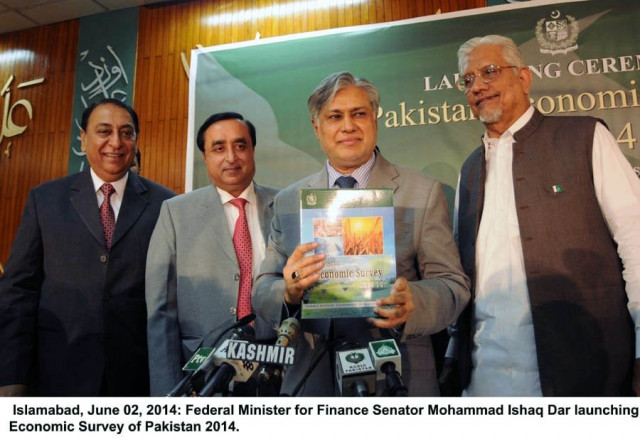Survey of the economy 2013-14
GDP growth of 4.14 per cent for 2013-14 fell short of the government’s target of 4.4 per cent set in the Annual Plan.

Finance Minister Ishaq Dar launching the Economic Survey 2013-14. PHOTO: PID
Moving on, the minister made a very grand pronouncement, which some would say read almost like a re-election pledge: that for every year of its remaining time in office, the PML-N government would increase GDP growth by one percentage point. By any account, this is quite a claim to make and the finance minister during his press conference made absolutely no explanation as to how this would be achieved. Of course, this is not to say that such economic turnarounds do not happen in the world, but then one would expect the finance minister to at least provide some kind of plan or road map when making such a promise. As for inflation, a very important macroeconomic indicator that reflects how ordinary people are impacted — since it measures relative changes to the purchasing power of their incomes — the minister gave the figure for ‘core inflation’ and said that it was 8.3 per cent, compared to 9.9 per cent for 2012-13. However, because this price change measure is calculated in such a way that it excludes products with volatile prices such as energy and food it tends to understate the real impact on household income, especially in an economy such as Pakistan’s. Exports, which should have grown substantially after the GSP-plus initiative with the European Union, grew only by a marginal four per cent, touching $21 billion compared to $20.1 billion the previous year.
When Finance Minister Dar has released 2012-13’s economic survey in June 2013, he had pledged that the then new government would eliminate the energy sector’s circular debt of some half a trillion rupees. While the PML-N government did manage to pay it off midway through fiscal 2013-14 the unfortunate reality is that it was far from eliminated and the figure has gradually ballooned to what it was this time last year. So while the country’s energy-generating capacity has increased during 2013-14 the crippling circular debt — which hangs like a millstone around the economy’s neck — is very much still there and needs to be dealt with on a permanent footing by the government.
Finally, taxation and here the finance minister, rather gleefully, told the media that Rs1,955 billion had been collected in tax in the first 11 months of 2013-14 (the most recent figures available to him, though the Survey mentions the amount for the first nine months) and this is disappointing given that this would mean that Pakistan’s oversize fiscal deficit is not going to be reduced any time soon. When any country spends more than it earns in income and revenue (usually through taxing its citizenry) then its debt burden will keep on rising and it will end up having fewer resources to spend on crucial sectors like health and education, and poverty-alleviation programmes. Nowhere will this felt more acutely than in an economy such as Pakistan’s.
Published in The Express Tribune, June 3rd, 2014.
Like Opinion & Editorial on Facebook, follow @ETOpEd on Twitter to receive all updates on all our daily pieces.


















COMMENTS
Comments are moderated and generally will be posted if they are on-topic and not abusive.
For more information, please see our Comments FAQ